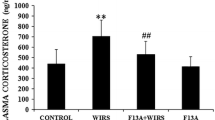Abstract
In August rats more resistant to acute stress-induced gastric damage than Wistar rats, preadaptation to nondamaging stress exposure did not prevent damage and even potentiated these damages. By contrast, in Wistar rats such adaptation decreased gastric damage caused by acute stress. Higher initial resistance of August rats to stress damage was associated with higher serotonin level and lower norepinephrine/serotonin ratio in the gastric mucosa than in Wistar rats. The negative effect of adaptation in August rats was associated with decreased serotonin level and increased norepinephrine/serotonin ratio in the stomach during stress. In Wistar rats exposed to stress the protective effect of adaptation was associated with an increase of serotonin content and a decrease of the norepinephrine/serotonin ratio in the stomach. Hence, the degree of resistance to stress-induced gastric damage can be due to genetically determined serotonin level and norepinephrine/serotonin ratio in the stomach.
Similar content being viewed by others
REFERENCES
S. V. Anichkov, I. S. Zavodskaya, E. V. Moreva, et al., Neurogenic Dystrophies and Drug Therapy Thereof [in Russian], Leningrad (1969).
O. N. Bondarenko, N. A. Bondarenko, and E. B. Manukhina, Byull. Eksp. Biol. Med., 128,No. 8, 157–160 (1999).
T. L. Virabyan, Monoaminergic Component in Mechanisms of Antiulcerative Effect of Neurotropic Agents, Abstract of Doct. Med. Sci. Dissertation, Erevan (1982).
M. O. Klimenko, V. I. Lupal'tsov, A. I. Yakhnyuk, et al., Fiziol. Zh. (Ukr.), 46,No. 4, 52–57 (2000).
L. A. Koryakina, Ros. Fiziol. Zh., 79,No. 9, 54–60 (1993).
L. A. Koryakina, Ibid., 80,No. 11, 64–70 (1994).
M. G. Pshennikova, N. A. Bondarenko, M. V. Shimkovich, et al., Byull. Eksp. Biol. Med., 128,No. 12, 638–641 (1999).
M. G. Pshennikova, N. A. Bondarenko, and M. V. Shimkovich, Ibid., 132,No. 11, 510–513 (2001).
M. G. Pshennikova, E. V. Popkova, N. A. Bondarenko, et al., Ros. Fiziol. Zh., 88,No. 4, 485–495 (2002).
M. G. Pshennikova, B. V. Smirin, O. N. Bondarenko, et al., Ibid., 86,No. 2, 174–181 (2000).
G. Ciurzynska, J. Dzierzkowska, and S. Maslinski, J. Physiol. Pharmacol., 45,No. 4, 517–532 (1994).
H. Goldman and C. Rosoff, Am. J. Pathol., 52, 227–243 (1968).
N. Ito, M. Kodama, Y. Ogawa, et al., Hiroshima J. Med. Sci., 32,No. 3, 329–339 (1983).
G. Orlicz-Szczesna, M. Zabel, and J. Jaroszewski, Z. Mikrosk. Anat. Forsch., 103,No. 3, 504–514 (1989).
Author information
Authors and Affiliations
Rights and permissions
About this article
Cite this article
Pshennikova, M.G., Popkova, E.V. & Shimkovich, M.V. Adaptation to Stress Improves Resistance to Gastric Damage during Acute Stress in Wistar Rats and Decreases Resistance in August Rats: Role of Serotonin. Bulletin of Experimental Biology and Medicine 134, 329–332 (2002). https://doi.org/10.1023/A:1021987626693
Issue Date:
DOI: https://doi.org/10.1023/A:1021987626693




